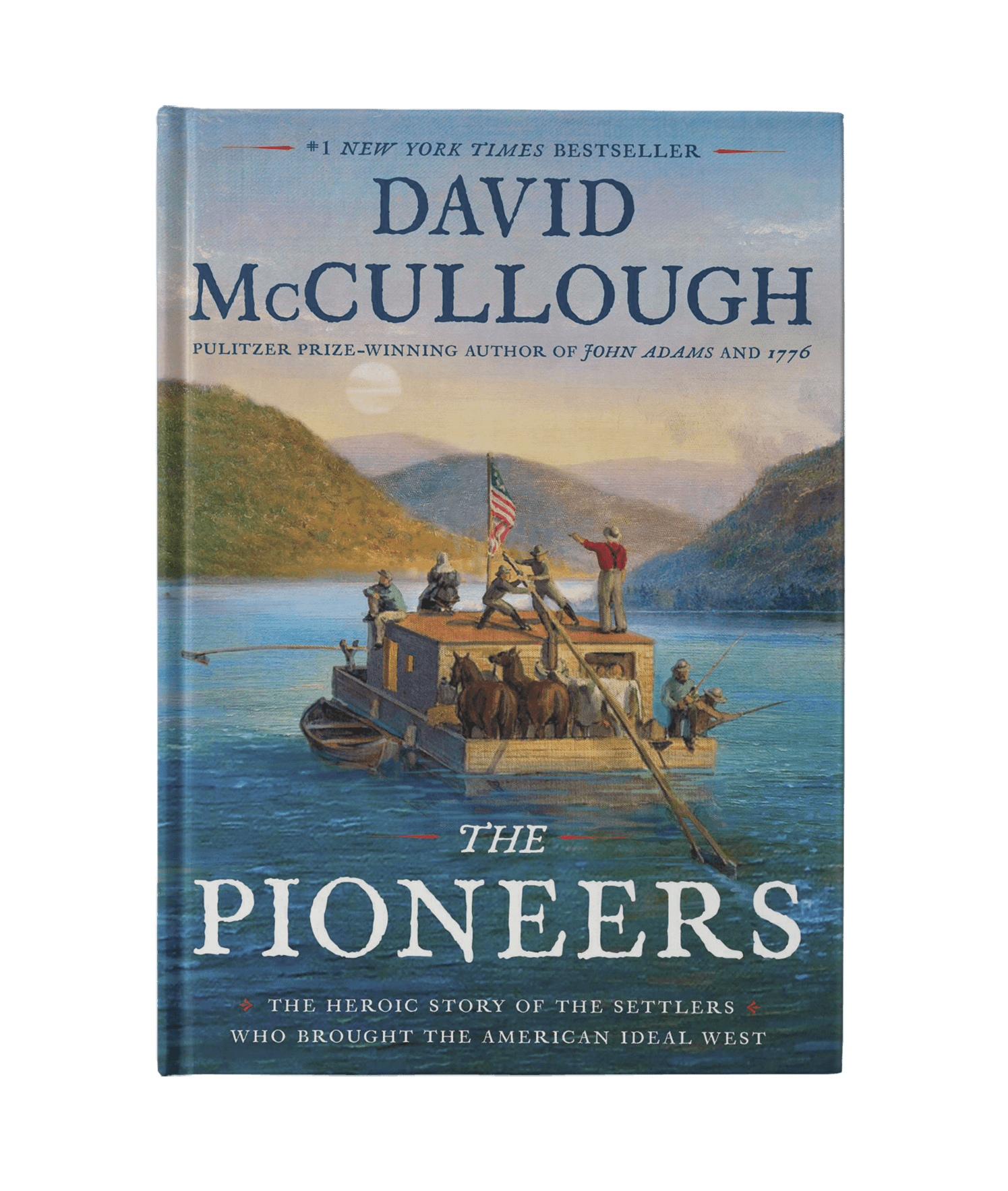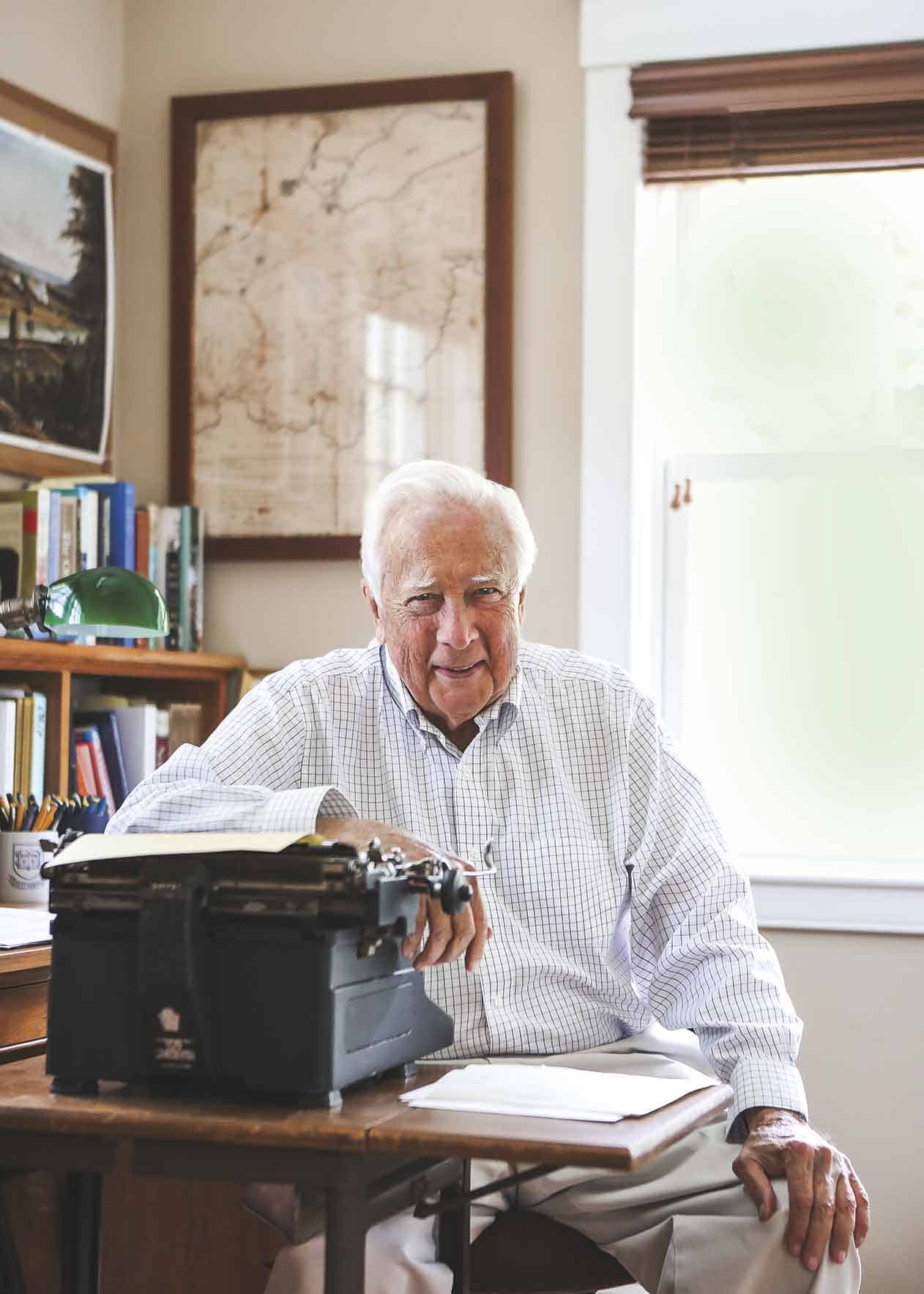Last spring, freelance writer David Kindy paid a visit to Pulitzer Prize-winning author David McCullough to chat about American history, his latest bestseller and his ancestral connection to Hingham.
By Dave Kindy | Photography by Derrick Zellmann
It is a spectacular spring day in Hingham and David McCullough is enjoying it. The two-time Pulitzer Prize-winning author is sitting in a rocking chair on the porch of his home while birds chirp and bees buzz among the flowers of the garden in his backyard. Bright sunshine pours over the scene, warming the air to the perfect temperature for daydreams and contemplative thoughts about the “what ifs” of history.
McCullough’s moment is suddenly shattered by a stranger who walks onto the farmer’s porch and asks about his health. “Never better,” he booms in that righteously resonant voice. After some idle banter, McCullough asks, “Who are you?” The visitor reminds him of the interview scheduled by his publicist.
“Oh,” the deep voice resounds. “I didn’t know about that. I must have looked at the wrong date in my calendar.” After a moment’s pause, he adds with a congenial smile, “That’s okay. Get settled in my office and I’ll join you in a moment.”
A lifetime of fame and fortune has not eroded the demeanor of David McCullough. He still evokes the polite, kind and mild manners he learned as a child growing up in Pittsburgh. Friendly and gregarious, McCullough is quick with a smile and equally fast with a joke. At one point, his cellphone rings and he glances at the number. “Excuse me a moment,” he says. “It’s CVS. At my age, that’s an important call!”
At 86 years young, the prolific author shows no signs of slowing down either. His most recent book “The Pioneers: The Heroic Story of the Settlers Who Brought the American Ideal West” (Simon & Schuster, 2019) was yet another New York Times bestseller. He is already thinking about his next project but is not ready to commit to anything yet.
“I don’t know what’s next for me,” he says. “It’s too early to tell, but I keep a list of ideas. I have to let the engine cool down. That was my 12th book, and I am very, very pleased about it.”
Tanned and white haired, McCullough speaks in slow, measured tones. The deliberate pace is not out of concern of saying something wrong; rather, it is the historian’s determination to tell the story right – the way it should be told.
McCullough won Pulitzers for his biographies “Truman” and “John Adams” —one of the fastest selling nonfiction books in history. He also received National Book Awards for “The Path Between the Seas” and “Mornings on Horseback.” He was honored with the Presidential Medal of Freedom in 2016.


David McCullough has written all of the first drafts of his books on a Royal typewriter he purchased secondhand in 1964. McCullough eschews the quiet tick-tack of a computer keyboard for the harsher click-clack of typewriter keys and the punctuating ding of the margin bell. It is how he writes, and it certainly has worked for him.
His most recent book is another epic retelling of a little-remembered moment in American history. McCullough chronicles the brave men and women, many from New England, who began the Westward expansion following the American Revolution and helped settle the Northwest Territory. This land—that would later become Ohio, Indiana, Illinois, Wisconsin and Michigan—would have monumental implications for the growing United States as it attempted to establish an ideal for what the country really should be, with true freedom.
“Nobody had told this story,” says McCullough. “Manasseh Cutler, who helped established the territory, said that it was not enough to put on paper that ‘All men are created equal,’ you have to show that you mean it. They created the first part of America where there would be no slaves.”
Critically acclaimed, “The Pioneers” is McCullough’s first book written entirely in Hingham. He started the project shortly after moving to the town three years ago to live in a 1799 farmhouse restored by his contractor son, Bill, who also built the adjacent building McCullough uses as his writer’s garret. Four of his five children reside in the town now, which is considered home by this extended clan.
“We’ve had 10 grandchildren graduate from Hingham public schools, went all the way from kindergarten through high school,” he explains. “All went on to very good colleges and universities. I think this is one of the finest public school systems I’ve ever known anything about. Superb teaching. Wonderful principals.”
McCullough is as comfortable with the ocean as he is with writing about history. He lived for years on Martha’s Vineyard and would go sailing at every opportunity with his family. He and his wife, Rosalee, still take to the seas but these days they tend to be passengers more than active sailors.


